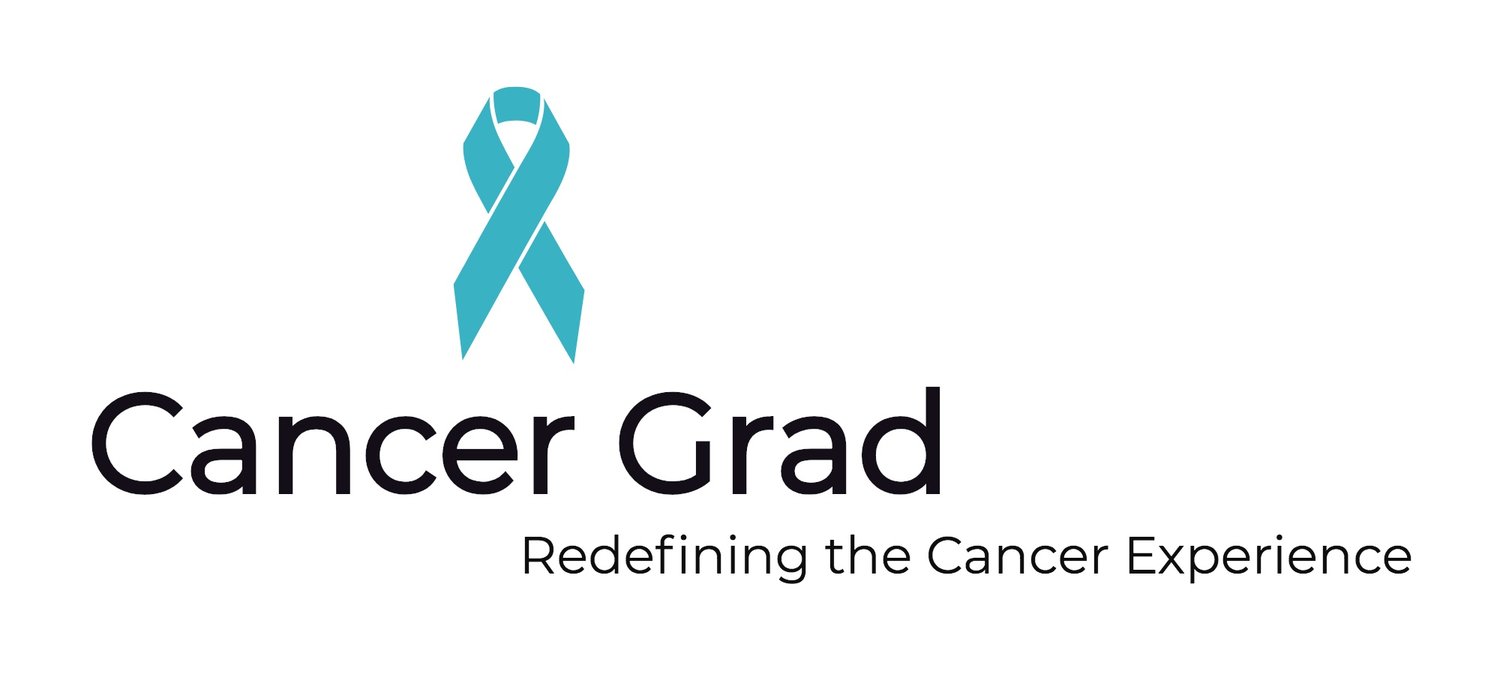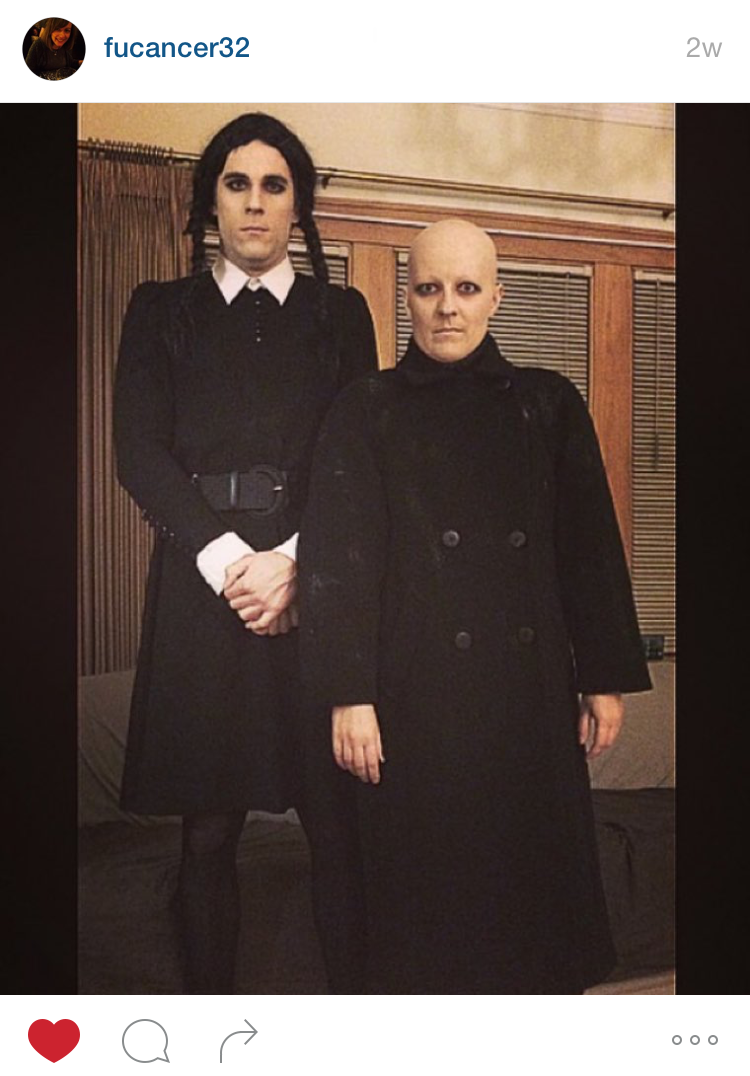Listen to the first episode of the “Lady Ballers” Podcast - hosted by me (Nora McMahon) and Samantha Ainuddin. We kick off ovarian cancer awareness month by discussing our ovarian cancer diagnoses, Sam’s genetic mutation, and a fantastic discussion with Sandy Rollman CEO, Robin Cohen. We hope you enjoy it!
Cancer Costumes...Halloween FUN
Halloween is for kids and cancer patients! There is a joy that overflows from a child when asked, “What do you want to be for Halloween?” With its endless possibilities to express who they want to become, who they idolize. As a cancer patient, the opportunity returns.
It is a time to embrace the changes, the baldness, the scars. A time to laugh at the hand you have been dealt.
It is a day off from taking CANCER seriously.
It is a time to take charge of YOUR identity, even if it is just for a day.
Halloween 2014 -a week after my double mastectomy- there was no party but there was an appointment to remove my final drain bag. Circumstance made my costume…I was the Bride of Frankenstein, cut up and put back together. My amazing husband dressed as Dr. Frankenstein to support my crazy.
It brought joy to what could have been an otherwise traumatizing situation. I had not seen my bare chest until that appointment and when I did my first thought was “What a F*CKING badass”. It set the tone for my journey to follow.
Love,
What do you want to be for Halloween?
Comment below.
10 Reasons To Go Barber Shopping Post-Chemo
10 Reasons to Go Barber Shopping Post Chemo
There are a ton of great blogs about how to help your hair grow back after chemo. Instead, I am going to talk about cutting it. I know…you want it to grow back as FAST as possible, why would you CUT it?
My first haircut was two months post chemo. I barely had any hair at all, but the hair I did have made it look like I just finished chemo…which I did. The baby bunny fur that was growing out of my head gave away my medical history to everyone that laid eyes on me and all I could see was their Pity.
My spirit couldn’t sit through the months of awkward Mullet, Chemo Fro—I had already been through enough.
In the midst of this emotional personal battle over what to do about my hair, Ruby Rose became popular. In case you don’t know who she is, she is the gender-fluid woman on “Orange is the New Black” who single-handedly made every straight woman question their sexuality. Seeing her hair inspired me to take back control over my own.
The Barber SHOP.
A place very few women venture became my hair sanctuary. I went from looking sickly to SICK in 20 minutes and for $20, and it was the first time I felt sexy since my cancer experience started.
Why you should go to a barber:
- Cheaper- $20 vs. $50 at a salon
- Faster- 20 minutes Start to Finish
- Experience- They KNOW how to cut short hair.
- No more Mullet Chemo Fro.
- You will feel like a Badass (and look like one too).
Barber Shop Tips:
- Yelp Barber Shops to find one you like (look at reviews and photos).
- Younger Barber’s know how to cut in the hip line work.
- Pin Men’s Hairstyles you think are sexy (You will be attracted to yourself ;-).
- Wash your hair before (they don’t wash it).
- Ask them for styling advice.
Walt is my barber and we have been together from that first cut over a year ago. We met online…yelp to be exact, and he has been a huge part of my cancer recovery. He makes my short hair look like a CHOICE, not a side effect.
Love,
P.S.-I hate to admit this, but there was a part of me that misses my bald chemo head—mainly the perks. I got out of a speeding ticket with a state trooper, people brought me food, and I could watch hours of Netflix with no judgement; but all good things must come to and end and I love finding the new me.
How long did you wait for your first post-chemo haircut? Comment below.
Survive vs. Graduate
Warrior. Fighter. Hero. Courage. Survivor.
These are just a few terms that may be familiar if you've ever been diagnosed with cancer. These are all wonderful words, and are usually used by people who want to support you through an incredibly difficult time in your life- people who want to honor your struggle.
I still vividly remember the first time someone referred to me as a cancer "survivor." It gave me pause- I had a visceral reaction, where I had to stop myself from revealing my cringing face. The term fell flat for me. At that moment, I wasn't sure why.
Surely, there is some truth in the term "cancer survivor"- most of us who have come through a diagnosis are keenly aware of our avoidance of death and the incredibly challenging circumstances towards becoming healthier. I understand why so many use the moniker with pride. If the name "survivor" is one that makes you feel proud and empowered, by all means-kudos to you, keep rockin' that term.
As I reflected on my reaction to the term, I was able to determine why "survivor" didn't resonate with me. Within the world of cancer, so much of the rhetoric surrounding the disease is couched in war and battle terminology. "Fight like a girl", "Cancer Warrior", "Kick cancer's ass" "Wage a war on cancer" are some popular examples. For those people who have passed on from the disease, we often read they have "lost their battle", or "lost their fight" with cancer. Is this supposed to mean they didn't "fight" hard enough? Does that truly honor their lives and their struggle?
Sure, some of us survive cancer, but I'm striving for more than survival. I'm striving to live out loud, to create, to learn more, love more, grow more, explore more, and share more during my time on earth, until I pass on and end up "studying abroad".
I never looked at my own cancer diagnosis through the war lens. I viewed it as some cells that went haywire in my lower abdomen (GO HOME, DNA. YOU'RE DRUNK.) - that my body needed a lot of help healing through surgery and chemo and teams of doctors and nurses and a comprehensive plan to get it back on track to healing itself. It was incredibly hard, but I learned much more about cancer and my body, about empathy and sympathy, about physical, mental and emotional strength, about love and support, about grief and pain, as well as joy and healing. I didn't just survive cancer. I got schooled by cancer, and then I graduated from it.
I love the power of words. I love trying to find the most appropriate, descriptive words to communicate emotions and experiences. So when Aniela and I asked each other the question, "What's an empowering term to call someone who has lived through a cancer diagnosis?" we thought long and hard about our choice of words.
Cancer Grad.
We hope that if you are getting schooled by cancer, that you graduate from it with honors.
Why Cancer Grad?
The first time someone called me a “Cancer Survivor” I recoiled in horror. It was a badge of honor that I was supposed to wear proudly, but instead it gave me the willies. “Survivor” signified only two options; being alive or being dead. My mother was a Skin Cancer and Breast Cancer “Survivor” but Ovarian Cancer revoked her title the day she passed away.
Many patients feel connected to the term, they feel like “WARRIORS”; which they are. In no way am I trying to diminish that. For me, the term didn’t fit and I had to find a new way to cope with my cancer diagnosis.
The question became, “What else can you call a Cancer Patient when they finish treatment?” My fellow cancer comrade, Nora, and I came up with “Graduate.” We are “Cancer Graduates.”
I spent the next 6 months refining the term. Why Cancer Graduate?
For me, there is a moment of recognition when talking to someone and finding out they also went through a cancer diagnosis. Instantly, we connect. It is the same moment of recognition when you find out someone went to the same university. “You went to CancerU, too? What campus?”
You ask what major they had. “I majored in Breasts, you majored in Prostate! How crazy.”
We reminisce about the parties where we had too many cocktails and were throwing up.
We compare courses; surgery, chemo, radiation.
There is a camaraderie…an understanding.
When we graduate some people become Alumni Donors-going to the games, sporting the team t-shirts and bumper stickers-while others move on only mentioning it in passing when they meet fellow alumni.
Imagine what the cancer experience would be like if we walked in with that same attitude as going away to college. Florida State University had a huge impact on my life, shaping who I am today, but it doesn’t define me. We enter college with the main goal of learning and we ask ourselves, “How can I use this knowledge to help the world, to help myself, and to change the future?”
I knew college was going to be difficult and expensive. I struggled but did it with an open heart and excitement. I found where to have fun, made life long friends, gained 15 lbs and cut my hair.
Sometimes when we think we are done with school, life happens and we have to go back for a Masters or PhD.
We enter cancer knowing it is going to be a struggle but at the same time curious about what we will learn. As Viktor Frankl said, “When we are no longer able to change a situation, we are challenged to change ourselves” and “between stimulus and response there is a space. In that space is our power to choose our response. In our response lies our growth and our freedom.”
Going to WAR carries a heavy emotional burden filled with images of death and destruction. Fear and Anger are powerful ways to propel oneself to action but over time can become overwhelming and difficult to bear. By changing our view of cancer from a war to be waged to an educational experience, it allows us to change our feelings of fighting to perseverance, fear to curiosity, pain to growth. It becomes lighter.
I am proud to be a “Cancer Graduate” and I can’t wait to share what I learned with the world.
What will you do with your degree?
Love,



















